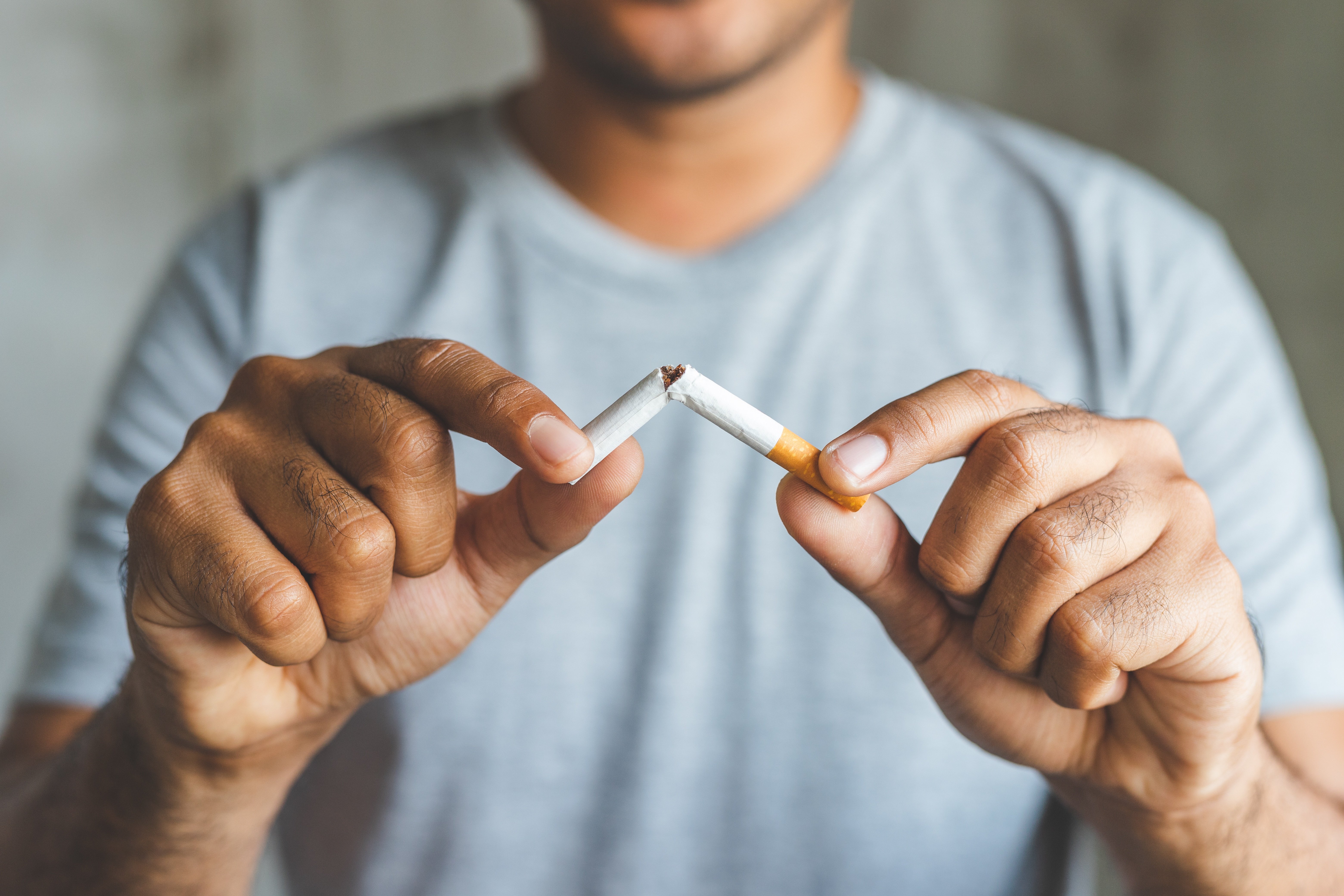
What is tobacco and Nicotine?
Tobacco is a plant that contains nicotine, an addictive drug with both stimulant and depressant effects. Tobacco leaves are used to make products that can be consumed in different ways, such as chewed, sniffed as snuff and smoked in cigarettes, cigars or pipes.
Nicotine is the chemical that makes smoking so addictive. Although nicotine is addictive, it is relatively harmless to health. It is the many other toxic chemicals contained in tobacco smoke that cause almost all the harm from smoking. Smoking gives you nicotine by burning tobacco, which creates many harmful toxins that can cause serious illnesses including cancer, lung disease, heart disease and stroke. Stopping smoking is the best thing you can do for your health.
What are the benefits of quitting?
There are many benefits to stopping smoking, including improving your physical and mental health and saving money.
- Cut your cancer risk. Stopping smoking reduces your risk of lung cancer and at least 14 other types of cancer.
- Lower your risk of lung and heart conditions including heart attack, stroke and chronic obstructive pulmonary disease (COPD).
- Feel healthier. Stopping smoking could help you feel better in your daily life. Many people report breathing more easily after giving up and that they have more energy.
- Improve your mental wellbeing. Potential positive feelings from smoking a cigarette only last for a short time. Stopping smoking can lower depression, anxiety, and stress in the long term.
- Protect your friends and family. There is no safe level of second-hand smoke, and passive smoking is particularly dangerous for children and those who are pregnant.
- Healthier appearance. Smoking can damage the skin and make it look grey, but stopping can help reverse this. Giving up smoking also stops your teeth becoming stained.
- Save money. Smoking can cost thousands of pounds a year.
How to stop smoking
Many people try to quit smoking with willpower alone, but it's much easier to go smoke-free with the right help. The best way to stop smoking is using a combination of stop smoking treatment and specialist help from free stop smoking services. You're up to 3 times more likely to stop smoking for good if you use a combination of stop smoking treatment and receive support from a Stop Smoking Service.
Stop smoking services are free to use and offer a range of help including:
- Talking to you about your motivation for stopping, and advise you on the methods that may work best for you.
- Giving you accurate information and advice, as well as professional support, during the first few months you stop smoking.
- Providing stop smoking treatment to help control cravings (prescription medicines)
- Advice on switching to nicotine replacement therapy which may include nicotine patches, gums, or e-cigarettes.
- Stop smoking advisers can also help you identify difficult situations when there may be a strong temptation to relapse and start smoking. And they can help you come up with ways to cope with or avoid these situations.
Withdrawal from nicotine can be challenging, but it can help if you look at the symptoms as signs that your body is recovering. Common symptoms include: cravings, restlessness, trouble concentrating or sleeping, irritability, anxiety, increases in appetite and weight gain. Many people find withdrawal symptoms disappear completely after two to four weeks.
How you choose to stop is up to you, so find the method that works for you. Giving up smoking for good might take a few attempts or involve trying different methods. If you've tried to quit before, think about what methods worked for you and what you might want to do differently. It can be hard to stop smoking, but keep trying.
Quitting tips
Here are some tips to help you succeed in giving up smoking.
- Pick a date in the future you would like to quit by and add it to your calendar. If you can make it to 28 days smoke-free, you're 5 times more likely to quit for good!
- List your reasons to quit.
- Tell people you're quitting.
- If you have tried to quit before, remember what worked.
- Have a plan if you are tempted to smoke.
- List your smoking triggers and how to avoid them.
- Keep cravings at bay by keeping busy.
- Exercise away the urge.
- Throw away all your cigarettes and tobacco products before you start.
- Resources like the NHS Quit Smoking app can help you quit by tracking your progress, seeing how much you’re saving and giving daily support.
Vaping and e-cigarettes
Vaping is not completely risk-free but it is substantially less harmful than smoking tobacco. Vaping should only be for adult smokers, to support quitting smoking and staying quit. If you have never smoked, you shouldn’t use e-cigarettes.
Although more research is needed into their long-term effects, studies so far have found that legal e-cigarettes are far less harmful than smoking. This is because they do not contain tobacco, which is responsible for the harmful effects of smoking cigarettes. Vaping gives you nicotine by heating an e-liquid, The liquid and vapour contain some potentially harmful chemicals also found in cigarette smoke, but at a much lower level.
In the UK, nicotine vaping products are tightly regulated for safety and quality. Always buy your vaping products from a reputable supplier like a specialist vape shop, pharmacy, supermarket or a UK-based online retailer so they are covered by UK safety and quality regulations.
If e-cigarettes have been used to quit smoking then, when you are ready and feel sure you won't go back to smoking, you can gradually reduce the nicotine strength in your e-liquid and your vaping frequency until you have stopped fully and are nicotine-free.
Where can I find out more?
There are many excellent resources available to help those hoping to quit smoking. Below are some useful links to further advice and guidance.



![The Solomon Trader [2025] EWCA Civ 1387: The ‘pay to be paid’ rule affirmed in the Court of Appeal](/fileadmin/uploads/ukpandi/News_Images/AdobeStock_104743067.jpeg)
